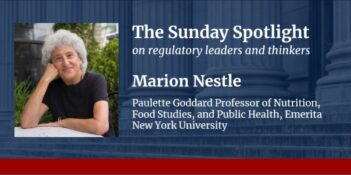
Upcoming FDA hearing could set the course for regulatory approval of the burgeoning CBD industry.
Never before have Americans been so pro-marijuana. According to one 2017 Pew Research Center poll, 61 percent of Americans favor legalization. Only 12 percent of Americans shared the same sentiment in 1969.
Most people likely associate marijuana with the psychoactive properties of its ingredient, tetrahydrocannabinol, commonly known as THC. But another component of the marijuana plant has experienced a surge in retail demand: cannabidiol, or CBD.
CBD is extracted from the marijuana plant, but it lacks the psychoactive properties people associate with marijuana’s more famous chemical component, THC. Furthermore, CBD can be directly derived from hemp production. Given that hemp production was legalized in the Agriculture Improvement Act of 2018, CBD production is expected to snowball over the coming years.
The CBD market today includes everything from oils, salves, and bath bombs. Some studies have suggested that CBD can help with sleep, anxiety, and even chronic pain.
Some market analysts project that the CBD market could reach up to $22 billion by 2022. The future of CBD, however, is not all green. The current regulatory landscape for CBD products is anything but certain. Even though hemp production may now be legal, it remains unclear whether people can use the derivatives of hemp.
Even though the regulatory landscape may be unclear, companies are moving forward. For example, Carl’s Jr., a nationwide fast-food chain, recently sold a CBD infused burger at a location in Denver to celebrate April 20. Other retailers are rolling out CBD infused food products, including everything from CBD-infused smoothies to ice cream and juices.
The Federal Food and Drug Act prohibits the introduction of any food that contains an additive which is also an active-ingredient in a Food and Drug Administration (FDA) approved drug into interstate commerce. Given the approval of Epidolex, the first-CBD-based drug approved by FDA as a means to treat epilepsy, FDA officials allege that it is currently illegal to introduce any CBD foods into interstate commerce or market CBD products as dietary supplements.
FDA enforcement officials have sent out numerous warning letters to firms marketing CBD products. In many cases, the CBD products in question were apparently tested by FDA officials who found vastly different CBD levels in the products than listed on product labels.
But FDA’s current view on CBD regulation could be changing. Former FDA Commissioner, Scott Gottlieb, recently testified to Congress that FDA has heard Congress “loud and clear” with respect to the 2018 Farm Bill. Gottlieb said that FDA might proceed with a rulemaking to allow CBD into the food supply. But Gottlieb remained uncertain what regulatory framework could apply to CBD. He mentioned the possibility that products with lower CBD concentration might be permitted in food or dietary supplements, even though drug formulations could contain higher concentrations.
Gottlieb cautioned, however, that a rulemaking process would not begin until after public hearings. FDA has a public hearing scheduled for May 31 to analyze the “safety, manufacturing, product quality, marketing, labeling, and sale of products containing cannabis or cannabis-derived compounds,” including CBD.
Another regulatory issue confronting CBD products arises from the fact that the U.S. Drug Enforcement Administration still classifies CBD as a Schedule I drug. The agency, however, has reclassified FDA-Approved drugs that contain less than 0.1 percent CBD as Schedule V drugs—an apparent carve out for Epidolex.
The state of California, which has legalized both medical and recreational marijuana use, similarly does not allow the use of CBD in food products. But within state-licensed cannabis dispensaries, the California Department of Public Health allows the sale of CBD products if the CBD is derived from cannabis or marijuana plants but not if derived from industrial hemp. This distinction is due to the current FDA regulations.
Colorado, on the other hand, has taken a different approach. The Colorado Department of Public Health & Environment allows the use of “all parts of the industrial hemp plant,” including CBD, as food ingredients. State officials argue that Colorado’s law legalizing industrial hemp cultivation supports this policy.
The differences between Colorado and California exemplify the uncertain regulatory future of CBD nationwide. But the upcoming FDA hearing could potentially pave the way for legal CBD food and dietary supplements.



